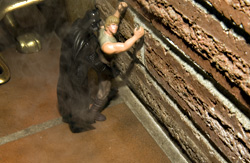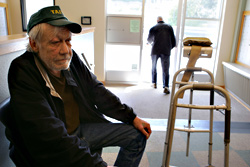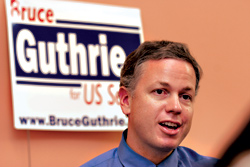One day in late July 2005, John Guth went for a drive in his red SUV. Five feet 6 inches with sandy blond hair, the slender 36-year-old lived in Maple Valley with his longtime partner on a street of tidy three-bedroom homes—as close to mainstream splendor as a gay man can get in the suburbs. He was popular among his neighbors, a gourmet cook with a taste for good cigars and Scotch whisky. In nearby Seattle, Guth was well-known, too—an obsessed Star Wars fan who’d gotten more than his 15 minutes of fame in 2002 for camping out at Belltown’s Cinerama for four months, waiting to be first in line to see the revived franchise’s Attack of the Clones and raising money for a children’s charity.
Guth had youngsters on his mind that July 2005 day as well. Somewhere in King County, he picked up a boy barely 15 years old, whom he’d met on MySpace. The boy got into Guth’s SUV, and Guth took him to a secluded area near the boy’s father’s home—where he showered the boy with gifts for his 15th birthday: black bikini underwear, a tight-fitting Under Armor T-shirt, and a new pair of jeans. The boy stripped naked in front of Guth and slid into the new duds. Guth then told the boy that he “looked good.”
Nine months later, Guth was dead, the victim of a double life and internal conflicts he could not resolve—a fundamentalist Christian with a hankering for young male flesh who’d failed to heed Yoda’s warning in Return of the Jedi: “Once you start down the dark path, forever will it dominate your destiny.”
Not long ago, in a galaxy not far away, John Guth sat on a sidewalk outside of Belltown’s Cinerama movie theater with his pal Jeff Tweiten. They were co-founders of the Seattle Star Wars Society (“The Official Force of the Northwest”) and, on New Year’s Day 2002, had decided to engage in the ultimate act of fanaticism—one tinged with echoes of Beckett and postmodernist attention seeking. The two would camp outside the theater, in a combined art project and act of holy devotion, for 136 days until Attack of the Clones opened in May. They also wanted to be first in line, and would use their project to raise money for the society’s Junior Jedi charity program. But at the time, they didn’t know if the new release would debut at Cinerama or somewhere else.
It was cold and rainy, and Guth and Tweiten had blown off home and hearth to do something most people would find crazy. For some reason, the world was very interested in their antics.
Each day, dozens of people stopped by to talk with—or at least heckle—Guth and Tweiten. “Get a life” was a constant refrain, the assumption being that these were pimpled losers better suited to sitting at home playing Dungeons & Dragons or staging Japanese anime marathons. Over 300 radio hosts interviewed them, including Howard Stern, and they were a regular morning feature on CNN. They also appeared on the Today Show and Good Morning America. Women flashed them as they passed in cars and trucks, and there were hundreds of newspaper articles as well.
Even The Wall Street Journal‘s online opinion page took a swipe at them: “What a tragic waste,” wrote James Taranto. “One hundred thirty-five days is almost enough time to get a life.”
To the inevitable question—why so obsessed with the fictitious Force?—they had ready answers.
“I don’t remember anything else about the third grade except Star Wars,” Guth said. “You remain true to that nostalgia of the era you grew up with. That’s what this is.”
“We love Star Wars,” said Tweiten. “And I want to create sort of a life art project out of this that can be displayed once this is over with. We plan on capturing our adventures and experiences on the streets of Seattle with our cameras and journals. What we do with it after it’s all done with, ask us then.”
People got their act on a gut level because Star Wars is magical and simplistic. Good vs. Evil, Light vs. Dark, Temptation vs. Resolve. The whole series was as easy to grasp as a Christian morality play. But with the added sci-fi texture, it was something children of all ages could fixate on for a lifetime.
Guth had first encountered the Force when he was a youngster in Maple Shade, N.J., a small town 10 miles east of Philadelphia. Born in 1969, he grew up in an old house with a large maple tree outside his bedroom window. His parents were devout fundamentalist Christians.
Now, he and Tweiten were the center of attention, and as their bit of performance art went on, other Star Wars geeks crafted parody posters of the duo. In one, their faces are superimposed on an image of Anakin Skywalker and Queen Padme Amidala, who are standing back to back. In another, the two are seated on their camping chairs, the Cinerama’s distinctive blocky sign behind them. Guth is wearing sunglasses, winter gloves, and an orange jacket, and has a tartan blanket wrapped around his legs. They even had their own Web site, waitingforstarwars.com, which is now defunct, and were such local celebs that some Star nerds had the two sign DVDs for them. They had wireless Internet service at their campsite, and companies donated goods such as soda and digital cameras.
Either Guth or Tweiten was always in line. (They were eventually lucky: Clones opened at Cinerama.) At night, they’d take turns going home and sleeping or crashing in a nearby van while the other waited, always available for media interviews. They became such an object of mirth for drive-time rock and roll DJs that New York’s WNEW-FM paid a local stripper to visit them. Among film fans, they were commonly written off as boobs.
“Those two idiots are not only the biggest, most pathetic geeks in the world, but they are also going to be sorely disappointed when Episode II sucks indescribable dick,” wrote one poster on a movie Web site. “Makes me wonder if these two guys have any life whatsoever outside of Star Wars,” wrote another.
One fanboy who interviewed the two ran into a peculiar moment when he asked Guth whom he would prefer to encounter sexually, Princess Leia or Queen Amidala.
“John was confused at first, thinking that I was asking which he would prefer as a sister,” says the fanboy. “I felt really dirty when explaining to him that I meant it in a sick-geek-fantasy sort of way.”
Before their late-July meeting, Guth and his 15-year-old acquaintance had communicated exclusively via e-mail, MySpace pages, and Instant Messenger. They mostly chatted about their days, movies, and the boy’s family life until they decided to meet in late July 2005. The boy’s parents were divorced, according to a police statement, and he split his time between the separate homes.
Seattle Weekly is calling the boy Gary to protect his identity. Details of the relationship between Guth and Gary are taken from a probable cause statement, written in 2006 by King County Sheriff’s Office detectives. A probable cause statement contains criminal allegations and is the basis for formal charges.
In August 2005, Guth met the boy again, this time at a Starbucks. Gary had his online profile age listed as 18, but later switched that to his real age of 15. He claimed that Guth told him that he was 27 or 28 years old and wanted to be his big brother. Gary, however, was clear about one thing in particular with the cops: Guth knew exactly how old his underage friend was.
At the time of their first encounter, Guth had been living with his partner, Bryan Barron, for 11 years. The two met in Grand Rapids, Mich., in 1994, where both worked in local theater. Barron and Guth were as committed as a gay couple could get absent a marriage license—supposedly living a life of suburban bliss.
Only two months before, Guth and Barron were at the Timberline Tavern on Denny Way, Barron performing karaoke while Guth chatted with friends. In August 2004, the pair celebrated their 10th anniversary with friends, throwing a lavish party at the Sorrento Hotel on First Hill.
But here Guth was, one year later, stopping at Southcenter Mall in his SUV before heading to his white, two-story house in Maple Valley, the 15-year-old boy in tow. They watched a movie in the living room and then had intercourse before Guth dropped Gary at an area near his father’s house.
Under Washington state laws, it is illegal for an adult to have sexual contact of any kind with anyone under the age of 16.
The two didn’t meet again until late September. This time, Gary told his parents that he was going to Southcenter on the bus. But Gary got off at the first bus stop at a location well before the mall, where Guth picked him up and drove back to Guth’s Maple Valley house. There, the two watched a movie and had sex.
For a few months, the pair relied on Instant Messenger and e-mails to stay in contact. In an e-mail on Dec. 3, 2005, Guth asks Gary about his driver’s education class at school and adds that Gary could text message Guth all he wanted once Guth bought Gary additional minutes for his prepaid cell phone.
The next day, according to the police statement, Gary wrote to Guth: “I’ll be fucking you later. lol.”
Guth’s reply was: “We’ll see, but not before I get you a few times little bro! BB.”
On Dec. 5, Gary sent Guth a message: “The first thought that came to my mind this morning was [to] have you lean over, and me just fuck you. lol hot huh? I love you, just knowing that soon I’ll be in ur [sic] arms makes me hard everyday.”
“No problem, bro,” Guth replies. “If you find yourself in your room all alone and all is quiet and you have a raging [h]ard on, feel free to call and leave a message for me ;-). . . . I miss you and love you right back! XOXOX KAO! BB.”
In December, the two had an online discussion about meeting with someone identified as Josh in a hotel room in the Seattle area, according to the police statement.
It was something the world (not to mention The Seattle Times, which ran a fawning obituary upon Guth’s death) never caught onto during his days in front of the Cinerama: Guth had a taste for young men, which would help sustain him financially and eventually contribute to his downfall.
Guth and his partner, Barron, settled in Seattle in the mid-1990s. At one point, Guth appeared as an extra in an episode of the sitcom Roseanne—but his film career would turn out to be one spent largely behind the camera, producing gay porn.
“Do you have what it takes? Are you an exhibitionist? Do you like the limelight? Get your fifteen minutes of fame,” read an appeal for novice actors on a Guth-owned Web site, seattleboyz.com—a subsidiary of Guth’s film production company, GAE Productions. His office was in a plain stucco building at the corner of East Denny Way and Bellevue Street on the lower reaches of Capitol Hill, just above I-5. GAE Productions also operated a subsidiary company called GAE Video, and his movies were sometimes marketed under the name GAE Boy Video.
There were plenty of takers for Guth’s talent pitch in Seattle’s gay community. Eventually, the Star Wars impresario produced 16 videos, many of them retailing for $50. They had titles that typically riffed off the term “Boyz”— Seattle Army Boyz and Seattle Boyz House Party among them.
Guth’s specialty was what are called “twink” videos—somewhat equivalent to barely legal schoolgirl porn—and his videos often featured the added draw of barebacking, as unprotected sex is commonly referred to in the gay community.
A 2002 release titled A Seattle Wet Summer is emblematic of the Guth oeuvre. Produced the same year as Guth’s Star Wars waiting game, a message at the beginning of the video is straightforward about Guth’s low-budget, amateur- actor approach: “No scripts, no fades, no graphics. We just film attractive guys having sex, naturally and in normal settings. Sometimes a guy just does not pull out in time or shoot in front of the camera like he should (bad boy!).”
Wet features a string of pretty, hairless boys going at it in hot tubs, jerking off alone on a bed with a dildo up their behinds, or fucking in a grove of ferns. There’s an obligatory ass-eating scene, but by porn standards, it’s hardly hot stuff. There is no story line, and the skinny actors go about their business wordlessly, with nary a grunt or groan. The sex comes off as remarkably disengaged, as if Guth’s boyz were animated statues, present only to fulfill a visual need as opposed to an erotic one.
Nevertheless, one local commentator termed Guth’s work a “genius niche marketing concept,” referring to the apparent treat of being able to see real locals doing the nasty. Some of Guth’s videos reached best-seller status with local distributors, and are available for mail order or rental at local video stores and for pay-per-minute streaming on Internet sites like barebackvideo.com and moviemonster.com.
Despite Guth’s Star Wars notoriety, his day job hardly caused a ripple publicly (or privately: His father had no idea his son was involved in the biz until contacted for this story)—except once, over a possible lawsuit. In April 2005, Guth told AVN Online, a porn industry news Web site, that an Internet billing service owed him a “few thousand dollars,” but that he planned to sue for five times that amount.
“There’s an element of principle to this whole thing,” Guth is quoted as saying. “It’s just business ethics, just getting what’s owed to me. What is owed to me is going to cover some major business expenses I have when it comes to paying the government. It’s not a matter of wanting to do this. It’s a hassle to me. It’s a hassle to my family—it’s a pain.”
There is no public record of the suit in Washington state.
There were a few clues in Guth’s upbringing that he would grow up to lead a double life. As a youngster, Guth became adept at keeping secrets from his parents. He would climb out the window of his second-floor bedroom at night, shimmy down a maple tree to the ground, and play for hours. One day, Guth’s father cut down the old maple not knowing that it was his son’s gateway to the night realm.
“John cried and cried,” says Guth’s father, Barry, who now lives in Greenville, S.C. “The young man was full of surprises.”
When he was 11, his father says that Guth found a junked mixing board. He brought it home and recorded his first song.
“Through the ability God gave him, he transformed it into 13 voices—like a men’s choir,” says Barry. “That’s the kind of intellect he had.”
Guth played the piano as well, but would not practice in front of his parents. His grandmother bought him a violin, and according to the elder Guth, he taught himself to play by ear. “John never did anything halfway,” says Barry.
When he was an adolescent, Guth cut out a section of wall in the back of his bedroom closet and covered the hole with a hinged piece of paneling. He thus created a walk-in space 5 feet high and 3 feet wide, rigging it for electricity and accumulating piles of magazines, music books, and comics. His father didn’t discover the hideout until Guth was 22, years after he had left the nest. His father sprang it on him when his son made one of his weekly phone calls to check in at home.
“John, let me ask you a question,” his father recalls saying. “How long ago did you cut that hole?” At that point, Guth’s father says that his son literally dropped the phone. “You can’t do anything without me finding out, even if it’s 10 years later,” Barry added.
In 1987, when he was 18, Guth moved to Greenville, S.C., to attend Bob Jones University, an old-line fundamentalist school. It is perhaps best known to non-Christians as the focus of a media uproar when then–presidential candidate George W. Bush visited the university despite its ban on interracial dating (since revoked). According to the school’s Web site, the university’s mission is to “grow Christ-like character that is Scripturally disciplined.” Among other things, students are barred from listening to rock and country music. Similarly, homosexuality and pornography are prohibited.
While at Bob Jones, Guth became a member of Mensa and studied radio and television production. But Guth grew restless and left school at the age of 20 without earning a degree.
“They couldn’t teach him anything,” says his father. “He was teaching the professors.”
On Dec. 14, 2005, Gary snuck out of his mother’s house. Guth picked him up in his SUV and took him home. The two watched a movie downstairs, then moved upstairs to watch porn while having sex in Guth’s bed.
Gary snuck out of his mother’s house the next day, and Guth again drove him to Maple Valley. This time, their sex was exclusively oral.
A few days later, Guth gave Gary a Christmas stocking filled with candy. At various times in their relationship, Guth gave Gary other gifts, according to the police statement. Among these were an iPod, red-white-and-blue underwear, and two anime DVDs.
This past January, the two met for coffee at an undisclosed location. Then, on Jan. 16, Gary “related a fantasy about the two of them excusing themselves to the bathroom, kissing, pressing against each other to feel John’s [Guth’s] erect penis, [Gary] reaching down and [Guth] saying, ‘Later Bro, I’ll be fucking you later bro,'” according to the police statement. Guth responded by saying he wanted to hear more.
According to police documents, Gary replied: “You’ll have to help me finish the ending next time im [sic] over there.”
To which Guth replied, “Ahhh, I see how that works. OK. How aggressive do you want it? ;-)”
Gary wrote back: “well you said we’d use dildos first, so hmmm. We’ll see how much energy you have. . . . I love you.”
Guth responded: “LOL, Oh yeah! But tell me, how aggressive do you want it, I mean do you want to be like totally dominated and told what to do and forced to do it or what? What level of aggression excites you the most?”
Something aggressive must have transpired soon thereafter, because on Feb. 9, Gary wrote Guth to ask how long it would take for “the pain” to go away, according to the police statement. Guth suggested that Gary wait another week and to keep Guth posted on his progress. Guth told him that if the pain didn’t abate, Guth would get him some ointment. Guth said he had the same problem when he first “started out” and it took a while for the pain to go away.
In late February, Gary left his father’s house, saying he was going jogging. Guth scooped Gary up nearby in his SUV and they drove to an unidentified location. According to the police statement, the two got in the backseat of the SUV, jerked one another off, and gave each other head. They then cleaned up with a white hand towel Guth kept in his SUV.
In early March, Guth helped Gary with his homework, according to the police statement. On March 14, Gary’s mother dropped him off at a library. There, Gary called Guth from a pay phone and Guth met him in the library’s parking lot at 4:30 p.m. They kissed, and Guth rubbed Gary’s back. But, this time, there was no sex.
At some point, Gary’s father and stepmother installed a keystroke recorder and other surveillance software on their son’s computer. They also accessed his MySpace account. Then they called the police.
On March 15, King County Sheriff’s Office Detective Christine Elias met with Gary’s father and stepmother. The next day, Elias interviewed Gary, who was 15 and a half at the time. He spared the investigator no details in outlining his relationship with Guth.
On March 17, the sheriff’s office got a search warrant, which it served on Guth at his Maple Valley home. Guth was arrested immediately on investigation of child rape in the third degree and communication with a minor for immoral purposes. Guth admitted that he knew Gary and had a picture of the boy in his wallet.
“He said the couch in the living room is the one we would want to investigate,” the probable cause statement reads. “He said that [Gary] was like a young brother to him. He said [Gary] shared a lot of sexual stories with him. He said that [Gary] jumped on him several times and he pushed him away. He said [Gary] grabbed his hand and put it on his crotch the other day. He said he told [Gary] that he can’t continue to grow if he thinks it is going to be sensual between them every time they are together. He said that [Gary] never asked him to use a condom.
“He said he was ‘not going to make any denials or conclusions that hard core penetration occurred. He said that there was no force used. John [Guth] said [Gary] was fourteen when they met and that [Gary] celebrated his fifteenth birthday with him. John then asked for an attorney and I did not question him any further.”
Guth was taken to the King County Jail on Fifth Avenue for processing and spent the night in jail. He was released on his own recognizance the following day at 5:58 p.m. He had no prior criminal record.
Three days later, Gary’s mother filed a temporary restraining order with King County Superior Court, seeking to prohibit Guth from coming within five miles of her son, his homes, his church, and his high school. The judge granted her 500 feet.
But Guth pre-empted the possible charges against him by inhaling a fatal dose of carbon monoxide fumes on April 13. He left no suicide note.
“He had so much talent and ability,” says Guth’s father. “But his downfall was, I believe, his lifestyle. He was raised a certain way and he rebelled against it—and the conflict became too much for him. John had a battle raging in his soul of good versus evil. He couldn’t handle the battle anymore.”
“I agree with everything John’s dad told you,” says Barron, who declined to discuss details of Guth’s death and the allegations against him. Other acquaintances of Guth’s did not answer multiple requests for comment.
If Guth had been convicted of third-degree child rape, he would have seen jail time, says Becky Roe, a criminal defense attorney who led the sex crimes unit in the King County Prosecuting Attorney’s Office for 15 years.
“The idea that he would be diverted outright is slim,” says Roe, noting that a standard sentence for a first offender is 12 to 14 months.
She feels that Guth’s background as a pornographer would have factored into the case. “Nobody is going to believe this is the first time,” she says.
Sgt. John Urquhart, a sheriff’s office spokesperson, says that there is no evidence that Guth had other relationships with minors. He says that the department was on the verge of arresting Guth when he killed himself.
“For a lot of guys, this is their first brush with the law,” says Detective Malinda Wilson, who heads the Seattle Police Department’s Internet Crimes Against Children Unit, part of a nationwide Department of Justice task force. “And what an embarrassing brush—I think they’d rather be known as someone who robbed a bank than someone who was a predator with kids.
“What’s so amazing,” Wilson says of her experience in similar cases, “is the capability of people to live two completely separate lives and fool [those] closest to them.”








